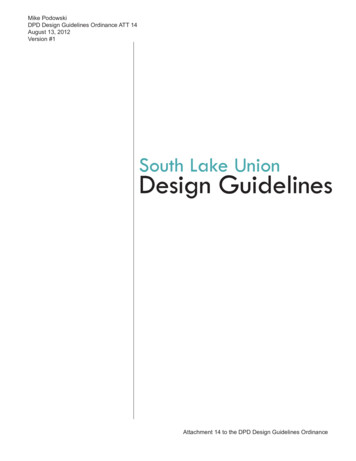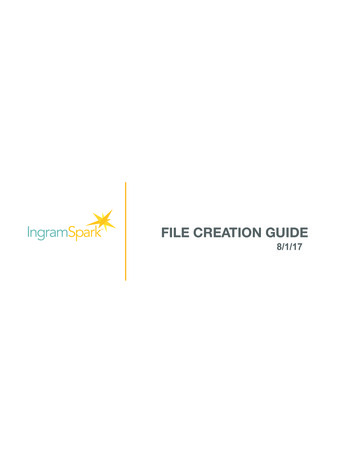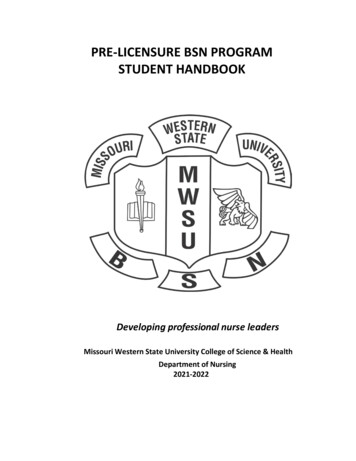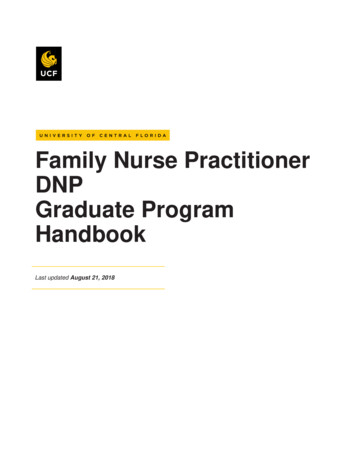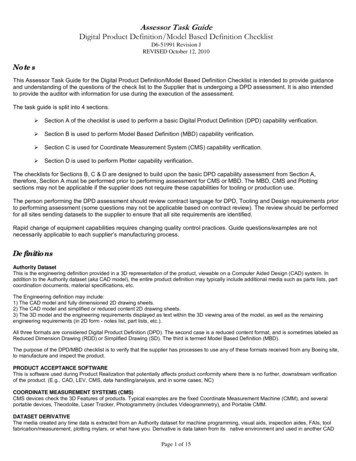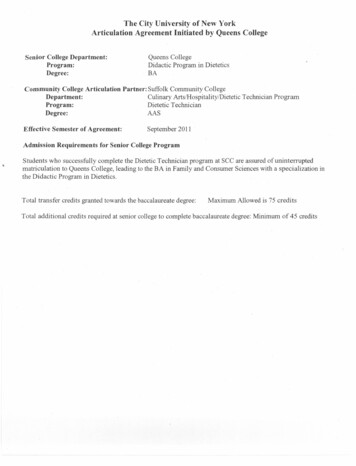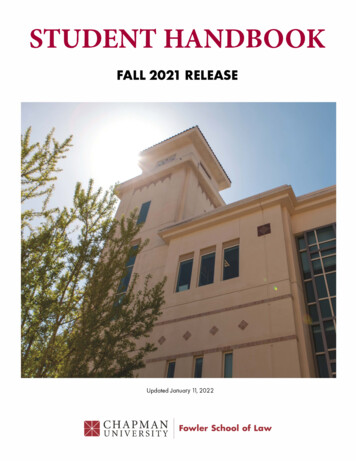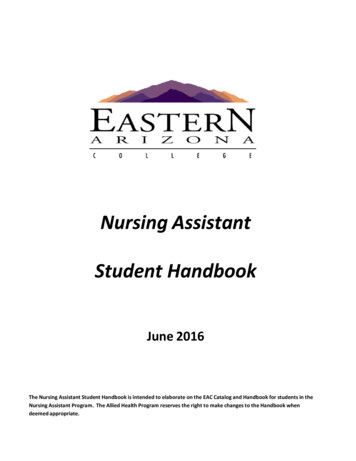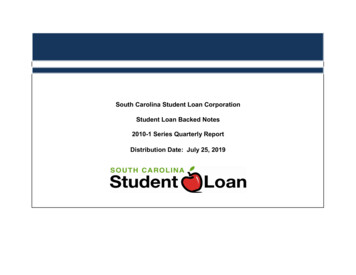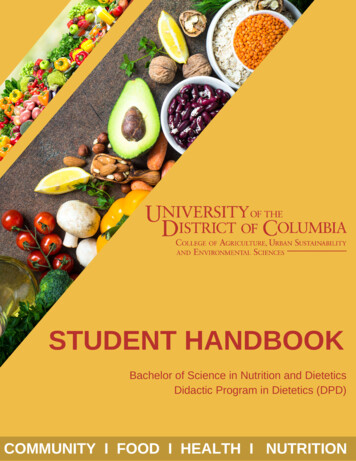
Transcription
STUDENT HANDBOOKBachelor of Science in Nutrition and DieteticsDidactic Program in Dietetics (DPD)COMMUNITY I FOOD I HEALTH I NUTRITION
TABLE OF CONTENTSWelcome . 5Program Director . 5Program Full Time Faculty . 5Overview of nutrition and dietetics profession . 6Overview of the UDC Nutrition and Dietetics Program and Didactic Program in Dietetics (DPD) . 6Mission, and Goals of the BS Nutrition and Dietetics Program and the Dpd . 7Mission . 7Goals and Objectives . 7Status of Accreditation by Accreditation Council for Education in Nutrition and Dietetics (ACEND). 8Degree Requirements and Student Learning Objectives . 8Verification of Completion of the DPD Course Curriculum . 8Guidelines for Transfer Applicants to the UDC BS Nutrition and dietetics/DPD Program. 9Nutrition And Food Science Courses . 9Other departmental requirements . 10Policy on Grievance Procedure . 10Practicum Experiences in the BS/DPD Course Curriculum . 10University Of District Of Columbia And The College Of Agriculture, Urban Sustainability And Environmental Studies . 11Admission requirements to the University of the District of Columbia and the BS/DPD . 11Undergraduate Students (Domestic) . 11international Students . 12Student Support Services . 13membership in campus nutrition groups . 13membership in professional nutrition associations . 13Academic Calendar . 13Cost to students . 14dietetic and nutrition student fees . 14Information about Financial Aid . 142
Eligibility for Aid . 15Application for Financial Aid . 15Federal Pell Grant . 15Work-Study . 16Scholarships available for dietetic majors . 16pursuit of Supervised Practice After Graduation With Bs In Nutrition And Dietetics and DPD Verification . 16Strategies to Enhance Acceptance to Dietetic Internships . 17Elements of Letters of recommendation for Dietetic Internship and jobs . 17Volunteer experiences and employment in food and nutrition related jobs . 18employment opportunities for Registered Dietitians . 19Salary Range for Registered Dietitians . 20requirements to maintain the rdn credential . 20pursuit of Graduate school after graduation with bs in nutrition and dietetics . 21pursuit of Job opportunities without the RD credential . 21definition of a “nutritionist’ and a Registered Dietitians . 23Licensure . 23Appendix A - Curriculum . 25APpendix B – ACEND Requirements . 282017 Standards for Didactic Program Core Knowledge . 28Apendix C - Admission and Graduation Requirements and Academic Policies for the University of the District of Columbiaand BS in nutrition and dietetics/Didactic Program in Dietetics (DPD) . 43Admissions Application . 43Requirements for Admission . 44Home-Schooled Applicants . 44Application Procedure for Admission . 44Freshman Applicants . 44Transfer Applicants . 45International Applicants . 45Admission procedures for entering the UDC DPD . 463
Sexual Harassment and Racial Harassment Policy Statement . 47Filing a Complaint . 47Equal Employment Opportunity and Affirmative Action . 47The Americans with Disabilities ACT (ADA) . 47The Family Education Rights and Privacy Act (FERPA) . 47Apendix D – Tuition and Other Student Fees . 49Undergraduate Resident Tuition and Fees, Spring 2018 . 49Undergraduate Metro Tuition and fees, spring 2018 . 49Undergraduate Non-Resident Tuition and fees, spring 2018 . 50Student Fees Spring 2018 . 52Apendix E –COMPUTER MATCHING FOR DIETETIC INTERNSHIPS . 53Apendix F –undergraduate academic standing policy . 56Probation and Suspension . 57Dismissal . 57Appendix G - Improving Your Chances For Admission To A Dietetic Internship Program . 58Freshman/Sophomore Year . 58Junior Year . 58Senior Year . 58APPENDIX H - Summer Internship Information . 59Websites: . 59Books: . 59APPENDIX I - Suggestions For Dietetics-Related Work Experiences . 60appendix j Statement of Understanding of Course Curriculum. 62Updated March 2018 . 634
WELCOMEWelcome To The Bachelor Of Science In Nutrition And Dietetics And The Didactic Program In Dietetics AtThe University Of The District Of ColumbiaThis handbook is designed to guide students through the Bachelor of Science in Nutrition and Dietetics andthe Didactic Program in Dietetics (DPD) in the College of Agriculture, Urban Sustainability and EnvironmentalSciences (CAUSES), University of the District of Columbia (UDC). The handbook will help you find answers tothe most commonly asked questions about the program curriculum, student learning objectives and coursework, about being a student at UDC, and about a career in dietetics and nutrition. It covers many importanttopics and answers questions such as: Description of the UDC Bachelor of Science in Nutrition and Dietetics and the DPD, including mission,goals and graduate outcomesAccreditation status, address and phone number of ACENDGraduation and DPD completion requirements and Student Learning ObjectivesGuidelines for Transfer Students and Obtaining Verification StatementsPracticum experiencesStudent Support services, membership in nutrition groups and academic calendarAdmission requirements and processCost to students, including books, uniforms, memberships, and tuitionPathway to becoming a Registered Dietitian (RD) or Registered Dietitian Nutritionist (RDN)Graduate Programs as an Option to Supervised PracticeSeeking Job Opportunities before a Dietetic Internship or Graduate SchoolWe hope you will refer to this handbook as one tool to guide you through your time here at UDC. Moreimportantly, we invite you to talk with the DPD Program Director and your assigned Program AcademicAdvisor at any time about courses, your schedule, and possible job opportunities. Your academic advisorwill help you each semester plan your semester course schedule and to assure that you are makingadequate progress towards your degree. Nutrition Program Academic Advisors are assigned when you enterthe program and will continue with you until graduation. If your academic advisor is unavailable, the DPDDirector would gladly answer your questions.Enjoy your educational experience at UDC and feel free to contact the nutrition faculty at any time.PROGRAM DIRECTORNancy Chapman, MPH, RDN, LDN, Director, BS Nutrition and Dietetics and Didactic Program in Dietetics,Building 44, Room 200-11, 202-274-5932PROGRAM FULL TIME FACULTYB. Michelle Harris, PhD, MPH, MS, RDN, LDN, Associate Professor Bldg.44, Room 200 04, 202-274-5739Allison Miner, EdD, MS, LDN, Director, Graduate Program, Bldg. 44, Room 200-09, 202-274-57215
OVERVIEW OF NUTRITION AND DIETETICS PROFESSIONA strong body of evidence demonstrates that nutrition and dietetics is integral in both prevention andtreatment of conditions across the life stages and most major killer diseases. The specific nutrition therapiesand education must be tailored to the individual’s genetic make-up, age, lifestyle, social-economic situation,cultural preferences, and physical abilities. More dietitians and nutritionists will be needed to provideeducation, counseling, and care for individuals with an expanding number of health conditions. TheDepartment of Labor and Statistics projects jobs for dietitians and nutritionists will grow 15 percent from 20162026. There are several pathways to join the nutrition and dietetics profession:1) Graduate with a Bachelor of Science in Nutrition and Dietetics,2) Become a registered dietitian nutritionist (RDN), and3) Continue education with a Master of Science in Nutrition.To become a Registered Dietitian or Registered Dietitian Nutritionist, a student must: Completed a minimum of bachelor degree at a US regionally accredited university or college and coursework accredited by the Accreditation Council for Education in Nutrition and Dietetics (ACEND ) of theAcademy of Nutrition and Dietetics. Completed an ACEND -accredited supervised practice program at a health-care facility, communityagency, or a foodservice corporation or combined with undergraduate or graduate studies. Typically, apractice program will run six to 12 months in length. Passed a national examination administered by the Commission on Dietetic Registration (CDR). Formore information regarding the examination, refer to CDR’s website at www.cdrnet.org. Completed continuing professional educational requirements to maintain registration. Become a Licensed or Certified Dietitian or Dietitian Nutritionist in the state or District ofColumbia where you will practice.OVERVIEW OF THE UDC NUTRITION AND DIETETICS PROGRAM AND DIDACTIC PROGRAM IN DIETETICS (DPD)The University of the District of Columbia (UDC) offers students Bachelor of Science Degree in Nutrition andDietetics with an accredited Didactic Program in Dietetics (DPD) program and a Master of Science in Nutritionin preparation to enter the nutrition and dietetics workforce and to apply for a supervised practice program.Students in the UDC program will obtain a science intensive, evidence-based education and culturallyversatile, practical experiences in the community, clinics, and governmental agencies in D.C.The UDC program prepares graduates to: Promote the nutrition and well-being of individuals and groups in a variety of settings Incorporate the application of the scientific method into nutrition, Gain requisite knowledge of nutrition and dietetics, Work as confident professionals and leaders in food service, community nutrition, nutritioneducation, and dietetics fields, and Develop skills that foster personal and professional growth as life-long learners and as leaders.The UDC nutrition and dietetics program provides a strong foundation in community nutrition, nutritioneducation, therapeutic nutrition, food science, food chemistry, food service management, human biology, andorganic chemistry as well as educational and motivational theory, social sciences, technology and informationsystems. It emphasizes critical thinking, communication skills, quantitative literacy, and the application oftheory to practice. The UDC BS/DPD student body crosses many age groups, race, ethnic, and socio-economicbackgrounds, prior academic degrees, international representation, and educational preparation.6
MISSION, AND GOALS OF THE BS NUTRITION AND DIETETICS PROGRAM AND THE DPDMISSIONThe mission of the University of District of Columbia Bachelor of Science in Nutrition and Dietetics Program andthe Didactic Program in Dietetics (DPD) is to ensure graduates will have the skills and knowledge to serve asprofessionals who deliver nutrition and dietetic services in community, food service, management, and clinicalsettings and are prepared for supervised practice leading to eligibility for the Commission on DieteticsRegistration credentialing exam to become a registered dietitian nutritionist (RDN).GOALS AND OBJECTIVESThe BS in Nutrition and Dietetics/DPD program has developed the following two goals and assessment toolsthrough discussions with faculty, the Nutrition Advisory Board, students, alumni, and administrators of UDC.Progress on achieving these objectives may be obtained from the program director.DPD Goal #1: The DPD will prepare graduates to be competent entry-level dietitians that apply knowledge andskills gained during the program.Objectives: At least 80 percent of program students will complete the program/degree requirements within sixyears. At least 80 percent of graduates will rate overall knowledge gained during the DPD as at leastsatisfactory (2) on scale of 1-3. At least 65 percent of DPD graduates over a 3-year period will apply for admission to a supervisedpractice programs prior to or within 12 months of graduation. At least 60 percent of DPD students over a 3-year period who apply to supervised practice programs willbe admitted within 12 months of graduation. At least 80 percent of DPD graduates applying to a DI will be admitted to a dietetic internship and/orgraduate program or will be employed within two years of graduation from the DPD. The program’s one-year pass rate (graduates who pass the registration exam within one year of firstattempt) on the CDR credentialing exam is at least 80 percent. At least 80 percent of surveyed supervised practice program directors will rate graduate’s preparationfor supervised practice as “satisfactory” on average on scale of 1-5.DPD Goal #2: To produce graduates with critical thinking skills necessary for supervised evidence-based practice,for leadership development and for graduate study.Objectives: At least 80 percent of program graduates are above average in their critical thinking skills, based onspecific assessments of student learning objectives for critical thinking. At least 40 percent of students over a 3-year period not entering supervised practice programs duringthe year they complete the program will gain acceptance into graduate school. At least 40 percent of students over a 3-year period not going onto supervised practice programs orgraduate school the year they complete the program will secure employment in nutrition.7
STATUS OF ACCREDITATION BY ACCREDITATION COUNCIL FOR EDUCATION IN NUTRITION ANDDIETETICS (ACEND)The baccalaureate degree in Nutrition and Dietetics (NUDT) Program with the Didactic Program in Dietetics(DPD) is accredited for seven-year periods, from 2015 through December 2022, by the Accreditation Councilfor Education in Nutrition and Dietetics (ACEND) of the Academy of Nutrition and Dietetics (AND) located at120 South Riverside Plaza, Suite 2190, Chicago, Illinois 60606-6995. Phone is 800- 877-1600. ACEND is aspecialized accrediting body recognized by the United States Department of Education and the Council forHigher Education Accreditation that affirms that ACEND meets national standards and is a reliable authority onthe quality of nutrition and dietetics education programs. The process of becoming accredited requires adetailed self-study and a site visit of how the UDC curriculum and program meets national standards.DEGREE REQUIREMENTS AND STUDENT LEARNING OBJECTIVESThe Bachelor of Science in Nutrition and Dietetics requires 120 credit hours: 54 credit hours of nutrition corecourses, 39 credit hours of science supportive courses, and 27 credit hours of general education courses. Thenutrition course sequence emphasizes study in chemistry, biology, human anatomy, food science and chemistry,nutrition biochemistry, nutrition education, community nutrition, nutrition through the life stages, food servicemanagement, advanced nutrition, and medical nutrition therapy. The BS Nutrition and Dietetics/ DPDcurriculum and course sequence appear in Appendix A. Upper level courses in nutrition require pre-requisitesthat appear in the UDC Course Schedules. The 2017 Knowledge Standards required by ACEND are stated inAppendix B and the UDC DPD courses that lead to achievement of these Student Learning Objectives are alsodescribed in Appendix B.To graduate from the BS in Nutrition and Dietetics program/DPD, all students must earn a C or above in allrequired courses (stated in Appendix A), maintain a minimum cum GPA of 2.0, complete the UDC generaleducation requirements, and submit completed application for graduation material by deadline date. Theaward of the degree is conditional upon the student's good standing in the university and the satisfaction ofall university graduation requirements.VERIFICATION OF COMPLETION OF THE DPD COURSE CURRICULUMTo receive a verification letter by the UDC DPD Director, student transcripts from UDC must show evidencethat all required science and nutrition/dietetics courses (Appendix A) which satisfy the competencies laid outby the Commission on Accreditation for Dietetics Education (Appendix B) have been completed with at least aC grade, and all required general education courses have been completed with at least a D. The DPD Directorwill issue a “Verification Statement” with the original signature, after review of the student’s official transcriptand evidence that all required DPD Curriculum courses have been completed with at least a C grade.The DPD curriculum requirements that students are expected to complete are those which they receivedupon admission to the Department. However, this course of study may be modified when changes to thecurriculum are made by the Nutrition and Dietetics faculty. Students should work with their advisor to assurethe correct courses are completed. Students who transfer courses from other colleges and universitiesshould read additional policies, specified in the UDC’s Course Catalog, that specifically relate to transfercourses.Students with a previous Bachelor degree who seek a “Verification Statement” only from the UDC DPDDirector will need to complete at 16 credits of upper level nutrition courses, including Therapeutic Nutrition Iand II Lectures and Labs, Nutrition Assessment, and Food Systems Management, with at least a C grade todemonstrate knowledge of the nutrition and dietetics required by ACEND. These classes must be taken as aregistered student and may not be audited. Students who are not pursuing a degree at the University or who8
have received a degree from another accredited institution may apply as special students. The DPD Directorwill work with these college graduates to determine what previous courses fulfill the other required, nongeneral education courses in the DPD curriculum, using official transcripts, course descriptions, and coursesyllabi. UDC will only provide course credit for courses taken at accredited colleges and universities; no creditis provided for work related experiences.International students must complete a degree from an American regionally accredited university orpresent documentation of the equivalence of their foreign degree(s). These students must take at least16 credit hours of 300 level NUDT courses (or above) at UDC.GUIDELINES FOR TRANSFER APPLICANTS TO THE UDC BS NUTRITION AND DIETETICS/DPD PROGRAMStudents transferring from other universities or community colleges into the DPD at UDC must have theircoursework evaluated for equivalency with UDC courses. Transfer applicants must submit the Application forAdmission, the non-refundable application fee, and official copies of all college transcripts showing coursework and grades earned in previously attended institutions. Official transcripts must be sent directly to theOffice of Admission by the student's previous college or university. Transfer students who have earned fewerthan 30 college credits also must have official copies of high school transcripts submitted. Acceptability oftransfer credits by the University is determined by the Office of Admission. Acceptability is based on theaccreditation of the previously attended institution and the student's level of performance (i.e., a grade of "C"or better; see section on Credit and Grading for additional information). At the time of application to theUniversity, transfer students must list all previously institutions attended. Failure to do so may result in thedenial of transfer credit. More details appear in Appendix C.Upon admission, students will receive a Transfer Credit Report, which shows how their coursework has beenaccepted by UDC. Transfer credit for General Education Requirements is determined through the UDCAdmissions Office.Transfer applicants wishing to apply for financial aid must also have each of their former colleges' or postsecondary schools' financial aid offices submit a financial aid transcript to the UDC Financial Aid Office.International transfer applicants must submit the same as above with the F-1 Transfer Certification Form.To obtain transfer credit for nutrition courses requires the Director of the UDC DPD to evaluate and approvecredits, based on whether courses meet the knowledge requirements established by ACEND (Appendix B). Thefollowing policies and procedures should be followed to obtain credit for these courses.NUTRITION AND FOOD SCIENCE COURSESTransfer credit for foods and nutrition courses not listed in the Transfer Credit Document of the University,will be considered by submitting the course syllabus, the catalog description, and the transcript to the Directorto determine equivalency. The Director will communicate with the student and the student’s advisor about
2) Become a registered dietitian nutritionist (RDN), and 3) Continue education with a Master of Science in Nutrition . To become a Registered Dietitian or Registered Dietitian Nutritionist, a student must: Completed a minimum of bachelor degree at a US regionally accredited university or college and course
